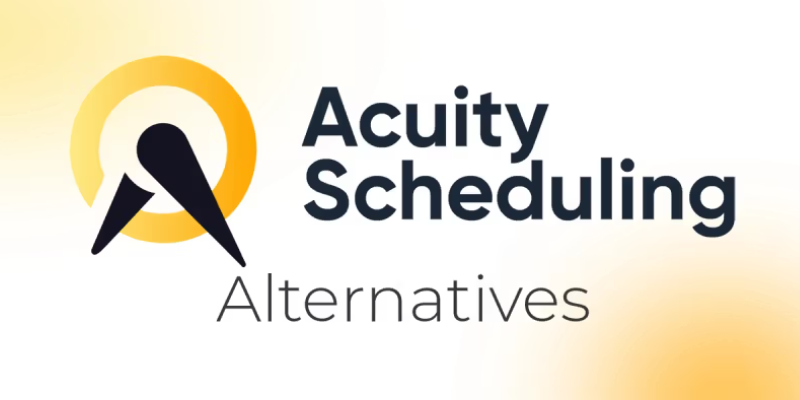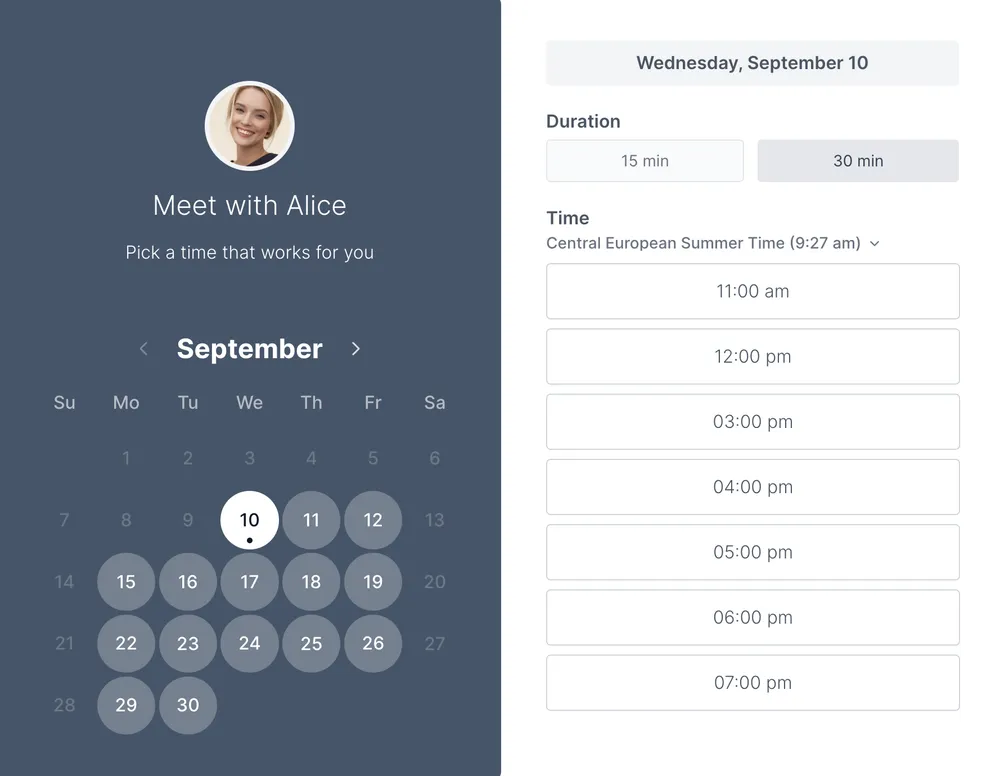Google Calendar works fine, until your workday gets a little more complex. Maybe you’re a freelancer juggling client meetings, a teacher or coach managing back-to-back sessions, or part of a team coordinating across time zones. Suddenly, endless reschedules, missing links, and double bookings start to pile up.
This is actually quite common. Many professionals reach a point where Google Calendar just isn’t enough. They need something easier, smarter, and better suited to their specific needs: tools that save time, protect focus, and make scheduling feel effortless again.
This guide walks you through the best Google Calendar alternatives available today, organized by real-world use cases and the types of users they serve best. Whether you care most about client bookings, team collaboration, or privacy-first scheduling, you’ll find the right fit here.
Best Google Calendar alternatives by software type and use case
 |  |  |  |  |  |  |  |  | Any.do | |
| Category | Appointment Scheduling, Business Teams, All-in-one scheduling tool | Appointment Scheduling, Business Teams | Acuity Scheduling | All-in-One Scheduling Tools | Business Teams | Business Teams | Privacy-Focused | Privacy-Focused, personal productivity | Personal productivity | Personal productivity |
| Use-Cases Served Best | Client bookings, team scheduling, education, demo calls, external scheduling | External scheduling, demo calls, team-wide booking | Paid sessions, recurring appointments, form-based intake | Online booking site, class sign-ups, resource scheduling | Focus time protection, internal meeting optimization | Internal meetings, delegated access, shared calendars | Secure personal scheduling, Google-free setup | Local/offline scheduling, minimalist use | Daily planning | Managing tasks, planning daily schedules, combining calendar and to-do lists |
| Key Differentiating Features | Unlimited bookings (free forever), 2-min setup, Google Calendar + video-call sync, Payments, Round-robin, Zapier integrations | Round-robin & collective scheduling, Deep CRM/Slack/Zapier integrations, Enterprise-level admin tools | Advanced intake forms, Subscriptions & gift cards, Staff/location-specific availability | Built-in booking website Manage staff/services/resources Coupons, reviews, gift cards | Auto-reschedules meetings, Team calendar sync, Slack status updates | Outlook/Teams/SharePoint integration, Calendar delegation, Multi-calendar overlays | End-to-end encrypted events & metadata, Zero tracking, Swiss-hosted under privacy law | Open-source, Offline support, Simple UI with no ads or tracking | Natural‑language event creation, Cross‑device support across Mac, iPhone, iPad, Apple Watch, Windows | Unified task and calendar view, Daily planner with smart suggestions, Cross-platform sync across mobile and web |
| Pricing Info | Free · Pro from $6.99/month (annual) | Free · Paid from $10/user/month | From $16/month · Up to $61/month | Free (50 bookings) · Paid up to $49.90/month | Free · Teams plan at $6.75/user/month | Included with Microsoft 365 · From $6/user/month | Free · Proton Unlimited from $9.99/month | Free | Limited Free plan Premium starts at $5.84/month | Free plan available · Premium starts at $4.99/month (billed annually) |
The categories that actually matter when choosing an alternative
There are many tools out there that can replace Google Calendar. The key is to know what exactly you need for your particular situation. To make this guide as useful as possible, we grouped tools by the real-world scenarios they serve best. Here’s how the categories break down:
- Appointment scheduling and client bookings: These tools are built for people who offer time-based services: freelancers, consultants, tutors, and coaches. The focus here is on ease of booking, reducing admin, and helping clients book themselves without friction.
- All-in-one scheduling platforms: If you run a business that needs more than just scheduling, like a booking website, marketing tools, payment collection, or staff coordination, these platforms deliver extra functionality beyond standard calendars.
- Business team and internal use: Some tools shine for internal coordination. These calendars help teams reduce meeting clutter, protect focus time, and streamline scheduling across departments.
- Privacy-focused or Google-free: Not every user wants to depend on a large tech ecosystem or share their data. These tools prioritize encryption, data ownership, and independence from Google.
- Personal productivity: Sometimes, you just want a calendar that looks great, feels intuitive, and keeps your day on track. These tools are for individuals who value aesthetics, simplicity, or offline control.
The quick summary below makes it easy to find the best Google Calendar alternative for your specific needs, whether you’re running a small business, managing client bookings, coordinating a busy team schedule, or simply organizing your days.
Google Calendar alternatives in depth
Koalendar
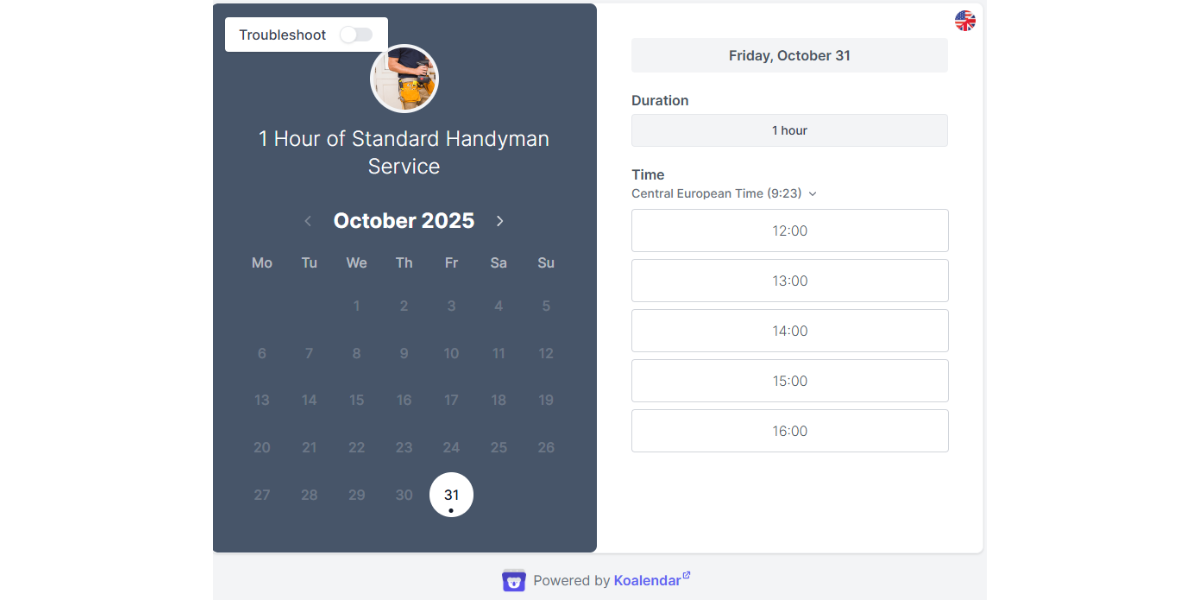
Koalendar was launched in 2020 and is designed to make scheduling as easy as sharing a link. Built with simplicity in mind, it helps professionals streamline bookings by offering clean, customizable booking pages, unlimited appointments (even on the free plan), and seamless integration with tools like Google Calendar and Zoom.
What it is: A lightweight scheduling tool that makes booking meetings simple for both individuals and teams.
Best for: Freelancers, educators, consultants, SMBs, and internal teams.
Top features:
- Unlimited bookings (even on the free forever plan)
- Custom-branded booking pages, round-robin, and payments available on paid
- Connects with Google Calendar, Zoom, and Meet
- Powerful integrations (CRM, Slack, Zapier)
What it lacks:
- No mobile app (yet)
- Fewer team-level features compared to enterprise-focused tools
Pricing:
Free forever unlimited bookings
Pro starts at $6.99/user/month (billed annually)
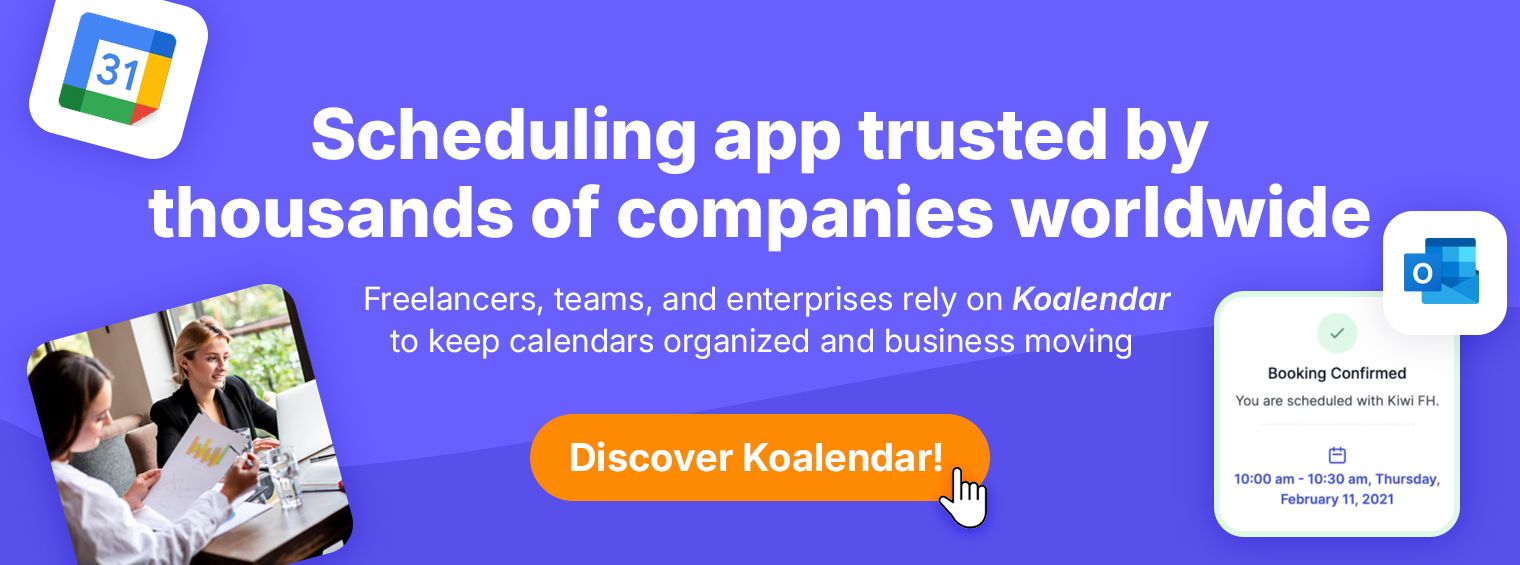
Calendly
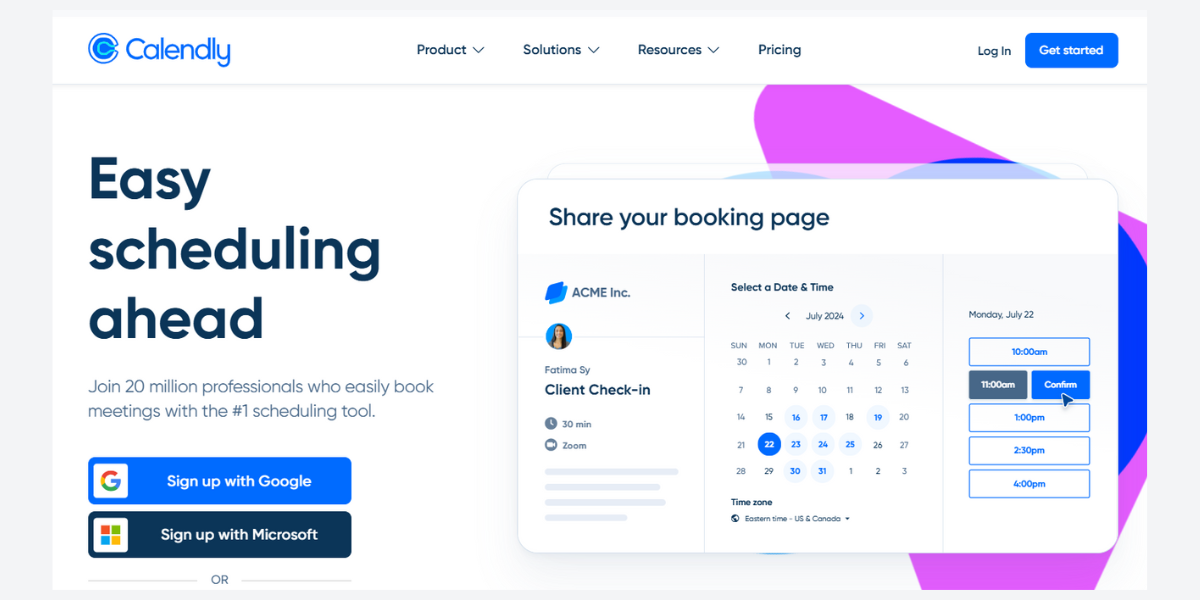
Calendly was founded in 2013 and it’s one of the most widely used scheduling platforms. It automates meeting coordination by letting others book time directly on your calendar, no email threads required. With powerful team features and deep integrations, it’s a go-to for sales, customer success, and remote teams.
What it is: A scheduling automation platform widely used by sales teams and client-facing professionals.
Best for: Sales, customer success, agencies, internal teams.
Top Features:
- Round-robin, collective, and one-on-one scheduling
- Powerful integrations (CRM, Slack, Zapier)
- Team analytics and routing logic
What it lacks:
- It can get pricey as the team size grows
- Free plan is limited (no group events, just 1 calendar sync)
Pricing:
Limited free plan available
Paid plans start at $10/user/month
Acuity Scheduling
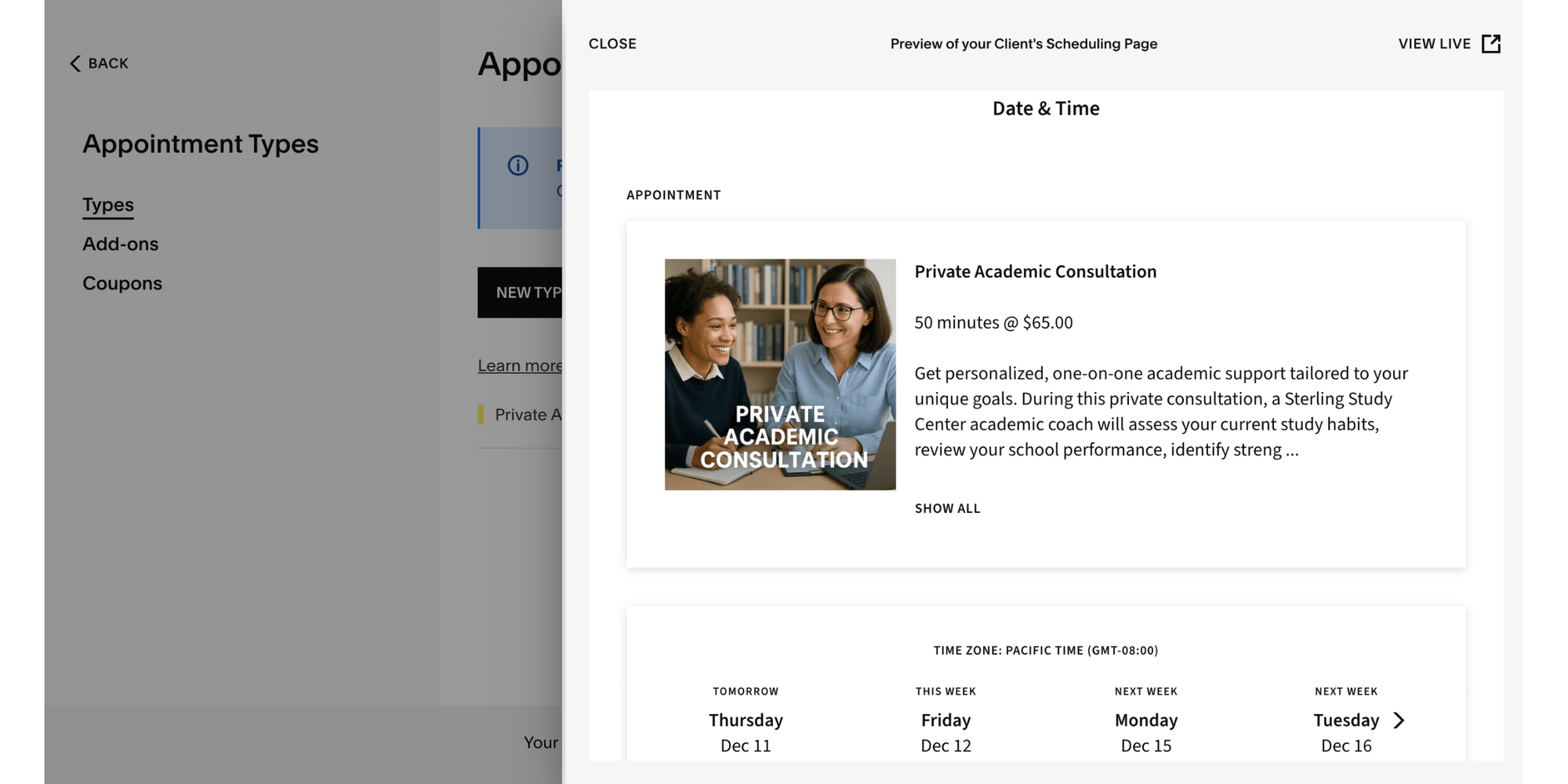
Acuity Scheduling started in 2006 as a solution for service-based professionals needing more control over client appointments. Today, it offers intake forms, payment processing, and multi-location availability, all while letting clients book and manage their own sessions online.
What it is: A highly customizable appointment scheduling platform, especially strong for service providers.
Best for: Coaches, consultants, wellness pros, salons, solo business owners.
Top Features:
- Custom client intake forms
- Accept payments, subscriptions, and deposits
- Multi-staff and multi-location scheduling
What it lacks:
- The interface can feel cluttered
- Slight learning curve for full customization
Pricing:
No free plan, only limited free trials
Paid starts at $16/month (billed annually), advanced features at $49–onwards
SimplyBook.me
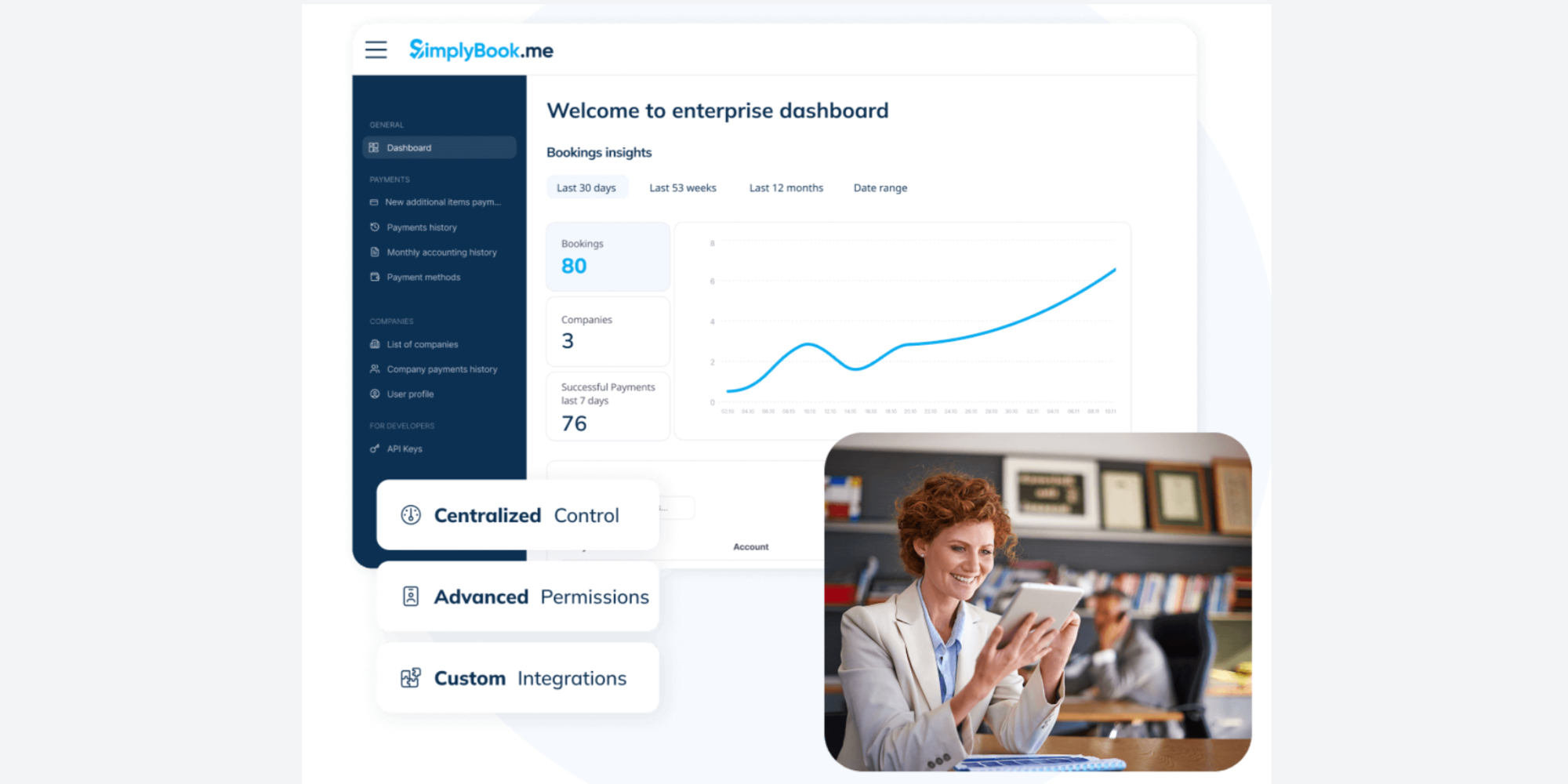
Developed in the early 2010s, SimplyBook.me is a comprehensive booking platform for service businesses. It goes beyond appointments by offering a full booking website, marketing tools like coupons and reviews, and resource management for teams and solo operators alike.
What it is: A full-service scheduling system with marketing and business management tools built in.
Best for: Small to mid-sized service businesses (salons, gyms, tutors).
Top Features:
- Booking website with customizable themes
- Coupons, client reviews, gift cards
- Resource and staff scheduling
What it lacks:
- Interface can be overwhelming for first-timers
- Some features are only available on higher-tier plans
Pricing:
Limited free plan (up to 50 bookings/month)
Paid starts at $8.25/user/month for 100 bookings (billed annually), up to $49.90/month
Clockwise
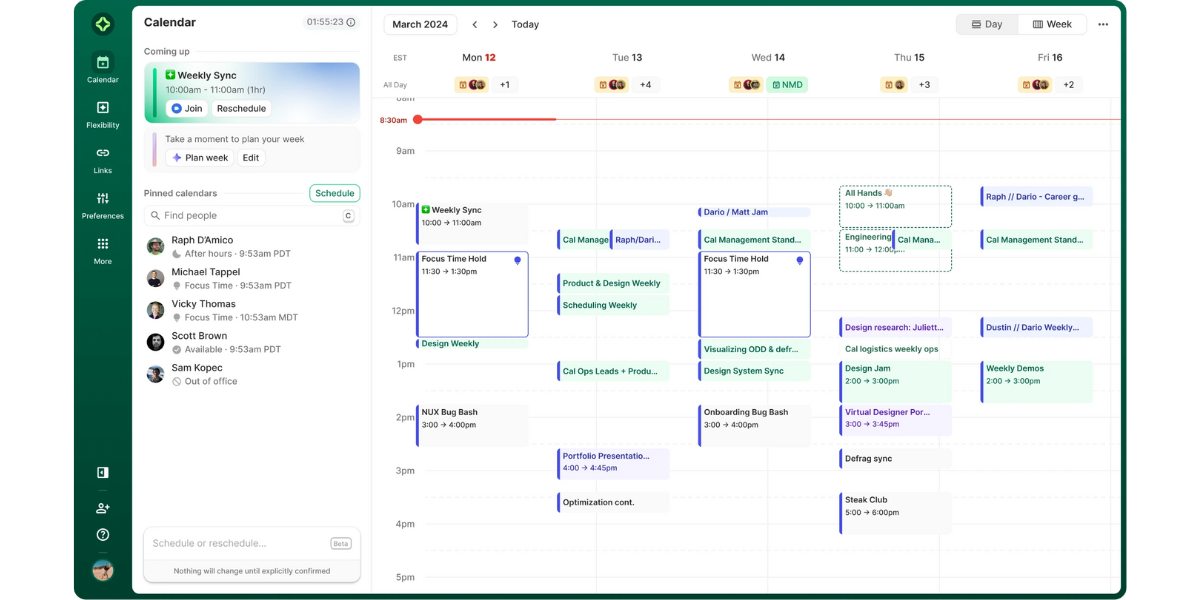
Founded in 2016, Clockwise positions itself as a time orchestration platform for teams. Instead of just storing meetings, it actively manages and optimizes them, automatically moving events to free up focus time and reduce burnout across busy calendars.
What it is: A smart calendar tool that automatically manages your team’s time to preserve focus and reduce overload.
Best for: Tech teams, remote companies, busy managers.
Top features:
- Automatically optimizes meeting times
- Protects blocks of deep work
- Slack and Google Calendar sync
What it lacks:
- Not designed for external scheduling or bookings
- Requires full access to calendars
Pricing:
Free plan available
Teams plan at $6.75/user/month
Microsoft Outlook Calendar
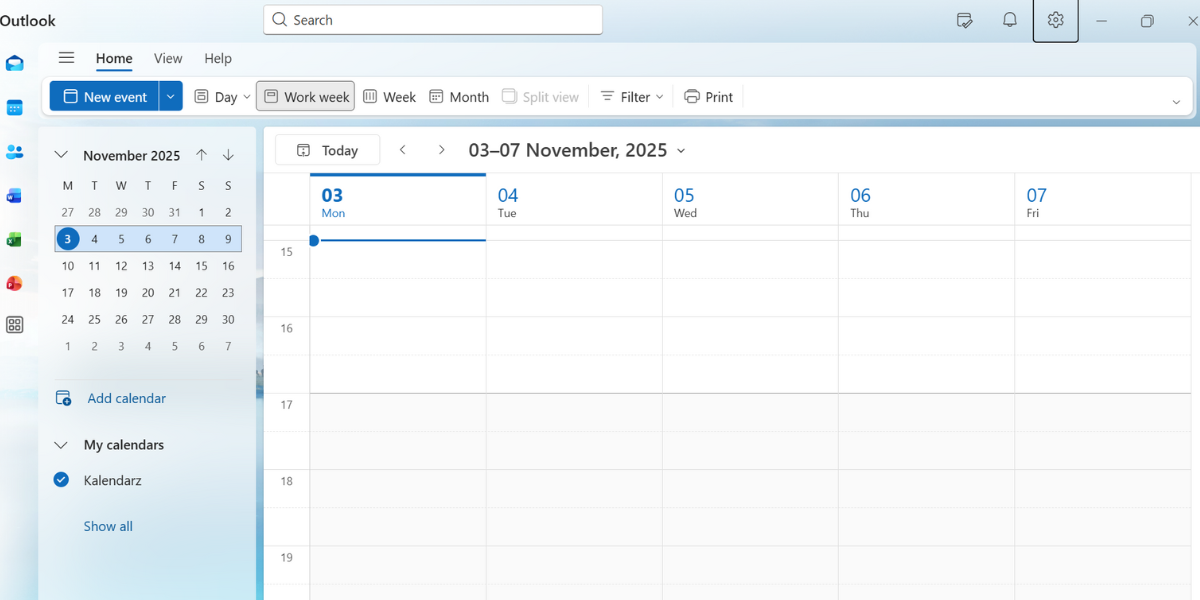
Microsoft Outlook Calendar is part of the Microsoft 365 ecosystem and has long been a staple for enterprise teams. Integrated tightly with email, tasks, and Teams, it supports delegated access, shared calendars, and complex scheduling needs in structured business environments.
What it is: A legacy calendar system used across enterprises for managing meetings, tasks, and shared schedules.
Best for: Enterprises, administrative roles, internal corporate use in the Microsoft 365 ecosystem.
Top Features:
- Shared calendars and group availability
- Delegate access for admins or assistants
- Deep integration with Teams and Outlook email
What it lacks:
- Not booking-friendly for external users
- The interface is heavier compared to modern tools
Pricing:
Included in Microsoft 365, subscriptions start at around $6/user/month for Business Basic.
Proton Calendar
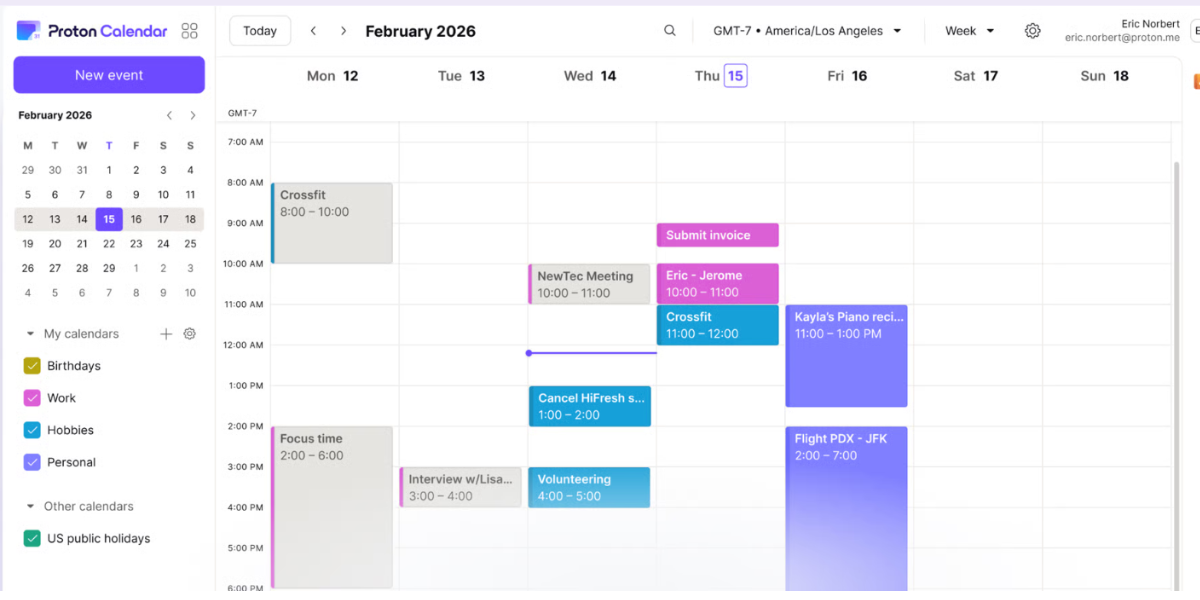
Proton Calendar was created by the privacy-focused team at Proton AG. Launched in the mid-2010s, it offers fully encrypted calendar events with no ads or tracking, built for users who want scheduling that’s secure by design and hosted outside major data ecosystems.
What it is: A privacy-first calendar service offering full encryption and data control.
Best for: Privacy-conscious users, journalists, researchers.
Top Features:
- End-to-end encrypted events
- Hosted in Switzerland (GDPR compliant)
- No ads or tracking
What it lacks:
- Lacks advanced scheduling or integrations
- No team scheduling or booking features
Pricing:
Free for basic, personal use
Paid starts at $3.99/month up to $14.99/month
Etar
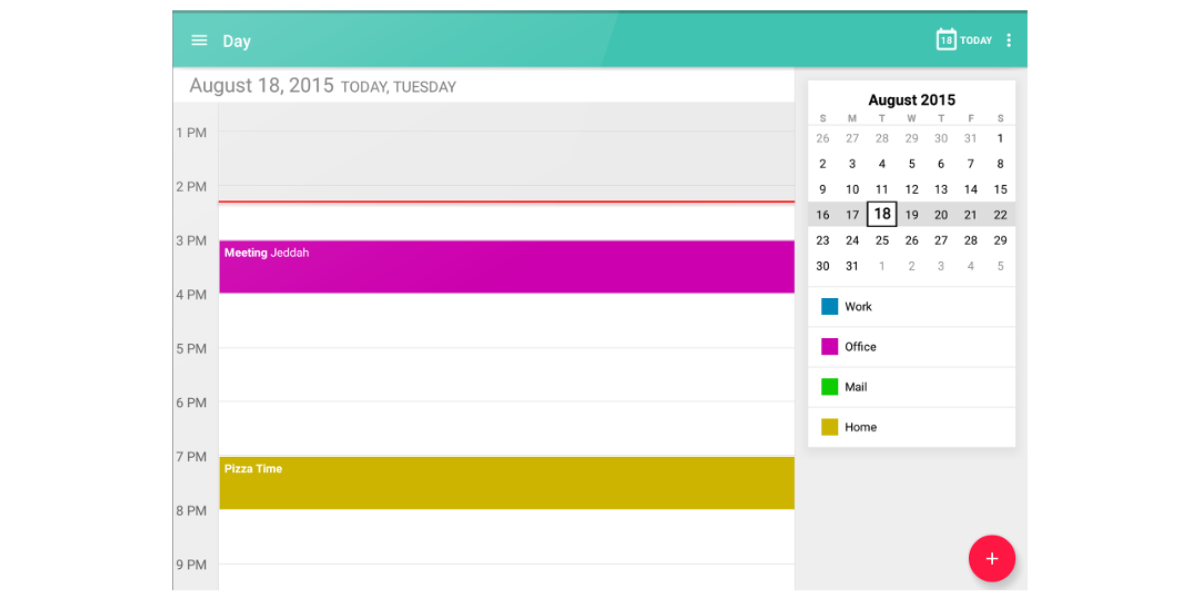
Etar is an open-source Android calendar app designed for simplicity and user control. With offline functionality, a clean interface, and no data tracking, it’s a great pick for anyone wanting a fast, privacy-respecting tool without big tech ties.
What it is: A minimalist, open-source Android calendar with a clean interface and no tracking.
Best for: Android users who want full control without ads or data harvesting.
Top Features:
- Offline access and syncing
- Dark/light themes
- Lightweight and privacy-safe
What it lacks:
- Only available on Android
- No built-in booking or automation
Pricing:
Free and open-source
Fantastical
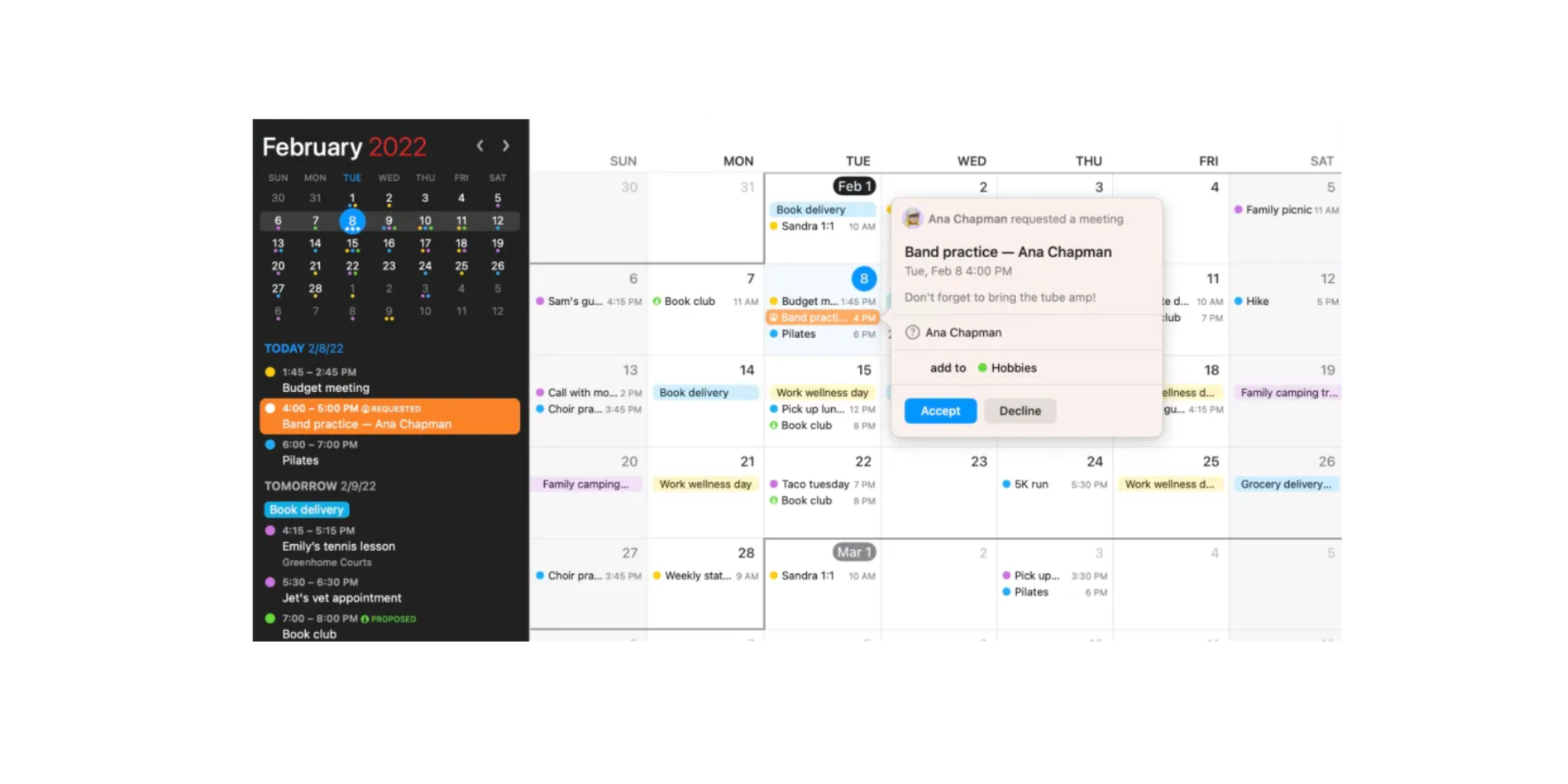
Developed by Flexibits in 2011, Fantastical is a premium calendar and productivity app designed for Apple users who want a seamless, elegant way to manage events, tasks, and schedules across all their devices.
What it is: A powerful scheduling app that combines calendar management, to-do lists, and smart scheduling tools in a visually rich and intuitive interface.
Best for: Individuals and professionals who use Apple devices and want a highly customizable, visually pleasing tool to organize multiple calendars, manage events and reminders, and streamline daily planning.
Top Features:
- Natural-language event creation
- Calendar sets and templates
- Travel time estimates and meeting link detection
- Syncs across Mac, iPhone, iPad, Apple Watch (and now Windows)
What it lacks:
- Free plan is very limited; most features are gated behind the paid version
- Premium pricing is considered high by many users
- Windows support is newer and less mature than Apple support
Pricing:
Free basic version available with limited features
Premium starts at $6.99/month (individual) or $4.75/month (billed annually)Family and team plans available at higher tiers
Any.do
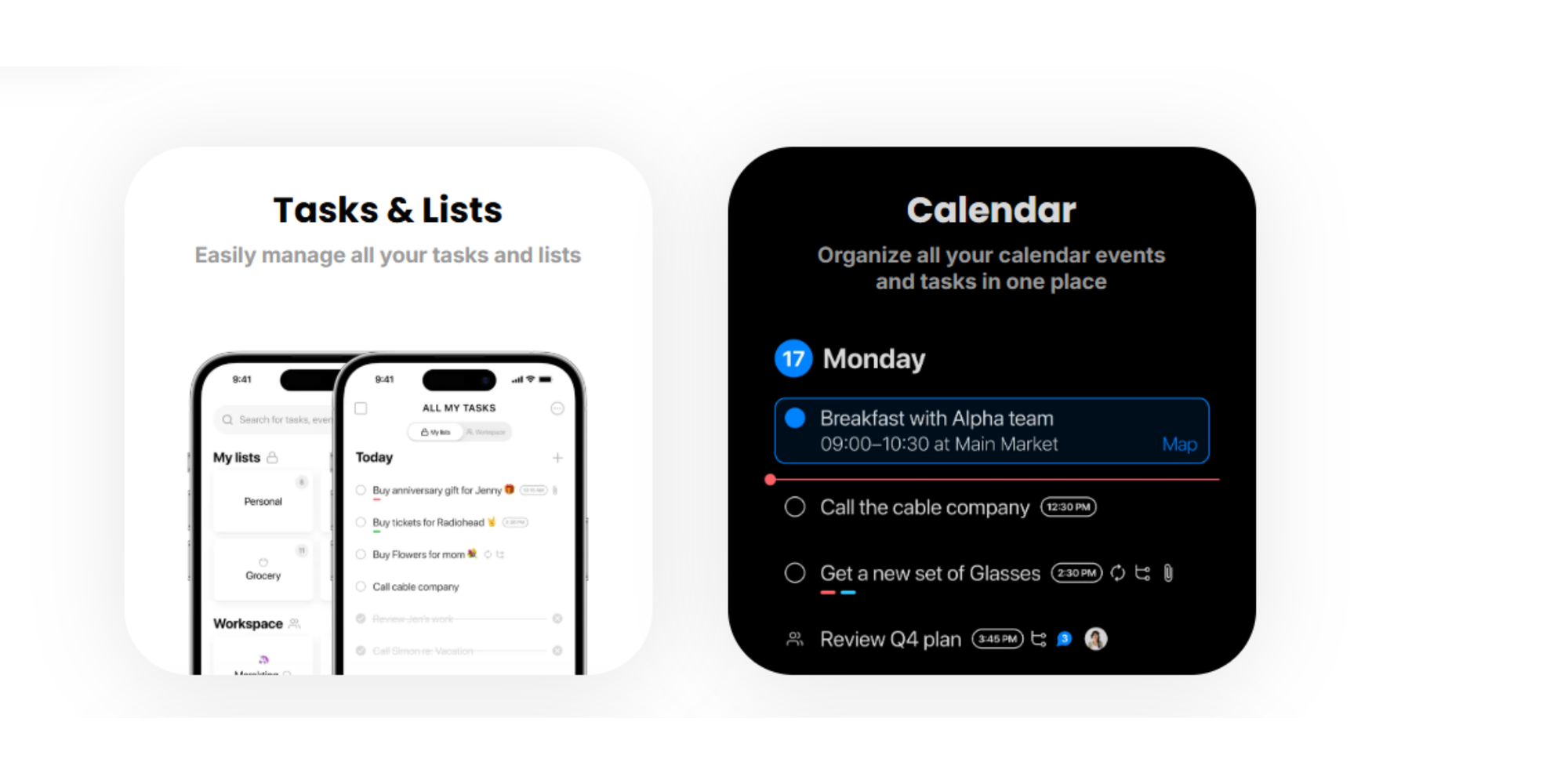
Launched in the early 2010s, Any.do is a productivity app that blends tasks, calendar events, reminders, and lists into one clean interface. It’s designed to help you manage your schedule and your to‑do items in one place.
What it is: A productivity platform combining calendar events, task lists, and reminders in one sleek app.
What it’s great for: Individuals who want an all‑in‑one personal planner, somebody who likes to track events and tasks, see what’s next with daily planning, and use widgets/reminders seamlessly across devices.
Top features:
- Combines tasks and calendar events in one unified view, so you don’t have to shift between apps
- Daily planner “suggestions” and widgets that prep you for the day
- Cross‑platform support (iOS, Android, web) with syncing and reminders
What it lacks:
- While it’s strong for personal productivity, it’s less optimized for external bookings or team scheduling
- Some advanced features (e.g., full task automation) require a paid plan
Pricing:
Free version available
Premium subscription begins at around US $4.99/month (annual billing) for full features
How to choose the best Google Calendar alternative
Choosing the best Google Calendar alternative isn’t just about features or price, it’s about finding a tool that actually fits your needs.
Now that you’ve seen the main categories of Google Calendar alternatives—from appointment scheduling tools and team schedulers to privacy-first calendars, and personal productivity apps— it’s time to narrow down things based on your real needs.
Before you start comparing integrations or plans, take a step back and think about what you use your calendar for. Do you mostly schedule internal meetings? Manage client appointments? Run classes or interviews? Or do you simply use it for daily planning? Your use case will shape which tool is truly the right fit.
For example:
- Freelancers and consultants need booking links, reminders, and payments options to manage client sessions without the back-and-forth
- Teams need shared calendars, focus time protection, and integrations with collaboration tools like Slack or Zoom
- Privacy-focused users care most about encryption, data ownership, and independence from big-tech ecosystems
- Teachers or coaches benefit from repeat session options and easy rebooking for students or clients
Software is very easy to use and quite helpful when trying to organise a time to meet with clients as you can block out unavailable times. This ensures there is no back and forth with clients.
Guy M.
Product Manager
Feature checklist (what to evaluate)
Once you’ve clarified your use cases, compare these essentials when reviewing calendar apps better than Google Calendar:
▢ Calendar sync (Google, Outlook, Apple)
▢ Meeting links and branded booking pages
▢ Buffer and availability control
▢ Automated reminders and confirmations
▢ Payment collection options
▢ Team scheduling and round-robin functionality
▢ Integration with tools you already use (Zoom, Slack, CRM, etc.)
Questions to ask before switching
- Does this tool support all the ways I schedule (internal meetings, client calls, or events)?
- Can I manage both personal and professional calendars without overlap?
- Can clients book and pay directly online?
- How secure is my data, and where is it stored?
- What does migration look like if I want to keep Google Calendar connected?
Migration tips
Most non-Google calendar scheduling tools make moving simple:
- Export your events from Google Calendar (.ics file)
- Import them into your new tool (most accept .ics)
- Keep your Google Calendar synced temporarily to avoid missing events
- Reconnect integrations like Zoom or Google Meet for seamless automation
Koalendar, for instance, lets you keep your Google Calendar connected while adding modern booking features, so you get the best of both worlds: familiarity and flexibility.
Final thoughts on finding the right Google Calendar alternative
Now that you’ve got a clear idea of your needs and have a list of candidates for Google Calendar alternatives, the best next step is simple: try them out.
Even the most detailed comparison charts can’t replace real experience. Every tool feels a little different: its interface, how it syncs with your existing setup, and how naturally it fits into your daily flow. That’s why testing the free version of a few scheduling tools is often the smartest way to discover which one truly works for you.
A hands-on trial helps you answer the real questions:
- Does it make booking genuinely easier?
- Can your clients or teammates use it without confusion?
- Does it integrate smoothly with your other tools?
- Does it save you time, or just add another tab to your browser?
Koalendar’s Free Forever Plan
Among all Google Calendar alternatives, Koalendar stands out for offering a Free Forever plan that’s actually powerful enough for daily use.
You can create unlimited bookings, connect your calendars, and start scheduling meetings, appointments, and sessions in minutes, no credit card, no trial countdown, no limits.
Even on the free plan, you can:
- Build professional, customized booking pages
- Sync instantly with Google Calendar and Google Meet
- Send automatic email confirmations
- Avoid double-bookings with smart availability detection
And when you’re ready to grow, Koalendar’s affordable Pro plan adds team features like round-robin scheduling, payments, and deeper customization, without overwhelming you with settings.




.png?w=800&fit=max&auto=format)
